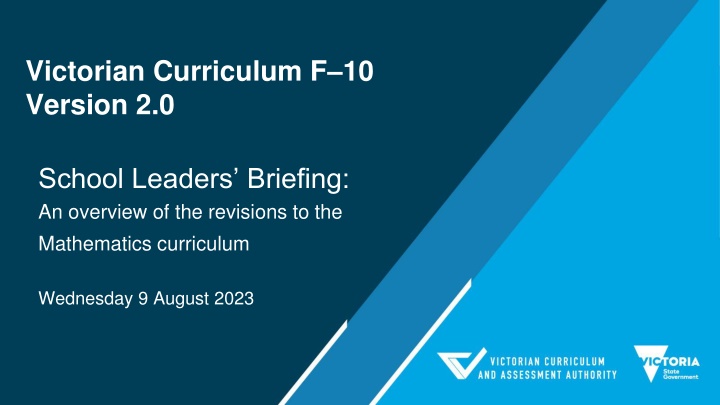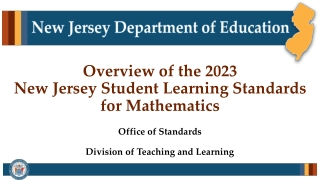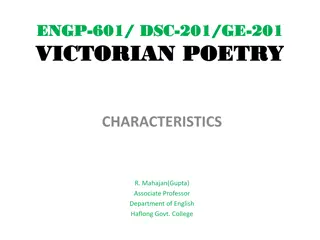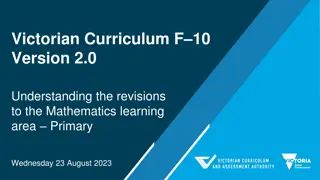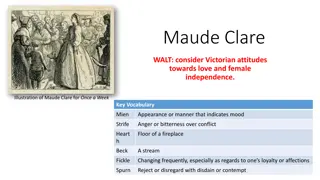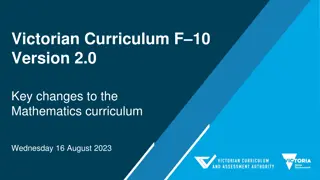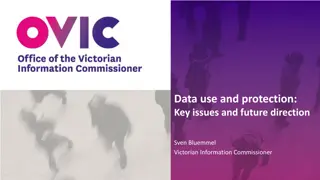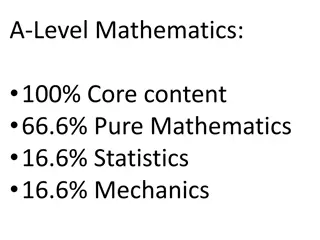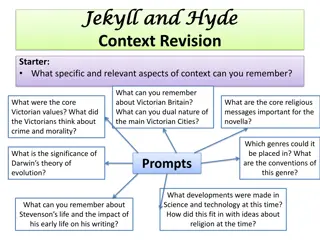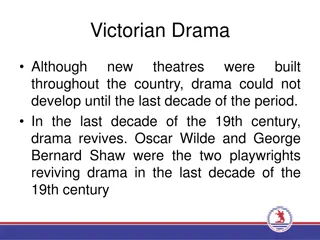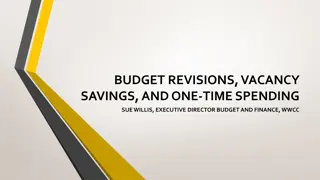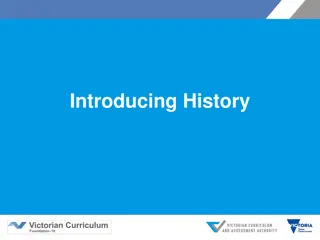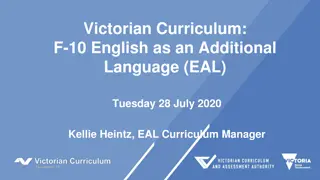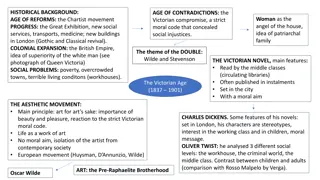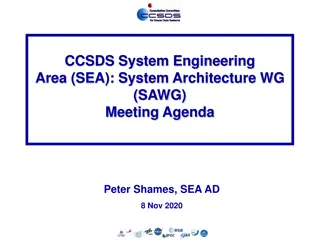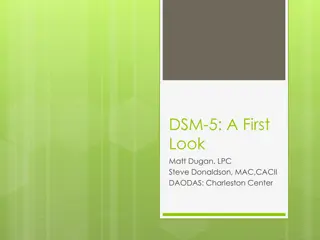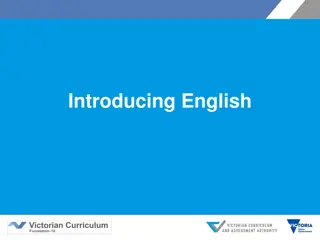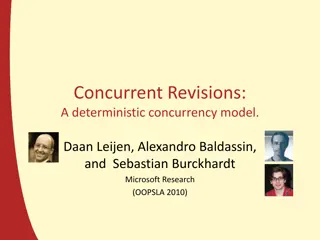Overview of Victorian Curriculum F-10 Mathematics Curriculum Revisions
The Victorian Curriculum F-10 is being revised to incorporate content from the Australian Curriculum Version 9.0 with the aim of making it more manageable and aligned with Victorian priorities. The revisions focus on ensuring efficient implementation, strengthening student access to essential knowledge, and supporting teacher confidence. Phased implementation is planned from 2024 onwards, with enhancements in content descriptions, achievement standards, and curriculum sequencing. The update aims to offer students enhanced connections to real-world experiences and reflect teacher expertise while providing clearer guidelines for assessment.
Download Presentation

Please find below an Image/Link to download the presentation.
The content on the website is provided AS IS for your information and personal use only. It may not be sold, licensed, or shared on other websites without obtaining consent from the author.If you encounter any issues during the download, it is possible that the publisher has removed the file from their server.
You are allowed to download the files provided on this website for personal or commercial use, subject to the condition that they are used lawfully. All files are the property of their respective owners.
The content on the website is provided AS IS for your information and personal use only. It may not be sold, licensed, or shared on other websites without obtaining consent from the author.
E N D
Presentation Transcript
Victorian Curriculum F10 Version 2.0 School Leaders Briefing: An overview of the revisions to the Mathematics curriculum Wednesday 9 August 2023
Overview of briefing 1. Overview of the revision and familiarisation of the Victorian Curriculum F 10 project Stephen Gniel CEO, VCAA 2. Revisions to the Mathematics curriculum Michael MacNeill Mathematics Curriculum Manager, VCAA 3. Familiarisation Leyna Buller Senior Policy and Strategic Advisor (F 10 Revision), VCAA
Project objectives The VCAA is developing the Victorian Curriculum F 10 Version 2.0 to incorporate content from the Australian Curriculum Version 9.0 and to refine the overall design and content to make it easier for teachers to implement efficiently and effectively. Building on the success of the current Victorian Curriculum F 10, the revisions will: Ensure the Australian Curriculum Version 9.0 is implemented in Victoria while maintaining Victorian priorities and standards Provide opportunities to strengthen the alignment with the Victorian Early Years Learning and Development Framework (VEYLDF) 1 5 Make the curriculum more teachable and manageable and strengthen student access to the essential knowledge and skills needed to be successful learners 6 2 Provide the necessary knowledge and skills for senior secondary pathways Develop a program of familiarisation and support resources (professional learning and resources) and monitoring that supports and enables Victorian teachers to implement the Victorian Curriculum F 10 with confidence 7 3 Improve achievement standards to help teachers assess student learning more effectively Support the delivery of the next generation of the curriculum in Victorian schools by ensuring the digital platforms are fit for purpose, accessible and user- friendly Continue to provide a high-quality curriculum that teachers can implement with confidence, including revisions that better meet the needs of Victorian students 8 4
Timeline Phased implementation from 2024 onwards Victorian Curriculum F 10 Mathematics Version 2.0 published 28 July 2023 Government and Catholic schools can implement from 2024, with full implementation in 2025 Implementation in independent schools is at the discretion of each school in the sector 2022 2023 2024 2025 Familiarisation Full Implementation Revision Familiarisation Mathematics Start Implementation
Introducing Mathematics Version 2.0 Offers student the opportunity to engage with essential knowledge and skills with enhanced connections to real-world experiences Reflects the expertise and feedback of our teachers A simplified and more manageable structure: embeds the Mathematical proficiencies greater scope to make connections across the Mathematics curriculum Clearer content descriptions and better-aligned achievement standards that are less open to interpretation, supporting assessment Better sequencing of concepts, with stronger links across strands Stronger alignment with VEYLDF and Senior Secondary, which creates a continuum of learning from birth to 18+
Victorian Curriculum F10 Mathematics Version 2.0 Revisions Michael MacNeill Mathematics Curriculum Manager, VCAA
The process of revision A revised Mathematics curriculum that assists students to connect Maths facts and procedures to real-world experience Consultation with an expert panel (teachers, academics and MAV) to ensure Victorian priorities and standards are maintained Contemporary concerns (NAPLAN, TIMSS, etc.) addressed Retained the well-defined facts and procedures scope of the current curriculum and included key investigative and modelling skills, as well as more clearly articulated content A curriculum that is future-facing and better connects students with the mathematical mindset they will need to engage with their world
Revisions Content is now organised under 6 strands with no sub-strands The 6 strands of Number, Algebra, Measurement, Space (formerly Geometry), Statistics and Probability mean teachers can continue to use the familiar connections between strand content and can also now explore new connections across different strand pairings There is broader contextualisation of where the learning area sits in relation to other learning areas through the introductory material There are clearer connections between the content descriptions and the achievement standards
Clearer Connections There are clearer connections between the content descriptions and the achievement standards. Current Mathematics curriculum Mathematics Version 2.0 Use equivalent number sentences involving addition and subtraction to find unknown quantities (VCMNA163) Find unknown values in numerical equations involving addition and subtraction, using the properties of numbers and operations VC2M4A01 CD Students identify unknown quantities in number sentences Students find unknown values in numerical equations involving addition and subtraction AS The content description provides clearer direction. The achievement standard is clearer about what a student needs to have achieved.
Revisions Content description clarity has been improved to more clearly articulate the proficiencies of Understanding, Fluency, Reasoning and Problem-solving. The key mathematical skills of mathematical modelling and statistical investigations feature more prominently, helping students to connect the more abstract concepts with real-world experiences and concepts. Changes to content descriptions mean they better encapsulate and articulate the scope of mathematical facts and associated procedures, incorporating the skills students need.
Mathematics Version 2.0 Levels 7 10: Greater emphasis on mathematical modelling, statistical investigation and estimation while retaining key foundational knowledge and skills as students approach senior secondary pathways Continued emphasis on computational and algorithmic thinking, including provision for pseudocode to support teachers who do not have background familiarity with simple coding languages A small number of new content descriptions that extend the scope of learning: Level 8 inclusion of 3-dimensional mapping, Level 10 inclusion of Planar graphs, Level 10 inclusion of logarithmic scales (not equations or laws) Levels F 6: Only 5 content strands at Foundation to Level 2 with Probability commencing at Level 3 Play- and exploration-based content positioned from Foundation to Level 2 Content re-sequenced to provide students opportunity to consolidate and master key skills Probability to commence at Level 3 permits consolidation of foundational counting and abstract engagement strategies (numerals, fractions, time) Increased prominence of computational and algorithmic thinking
Level 10A Designed to complement Level 10 content Not a standalone level no achievement standards Not required content for access to any of the VCE Mathematics suite Continues to provide students and teachers with a set of content cognitively positioned between Level 10 and Units 1 and 2 VCE Content is organised by strand to facilitate sequencing Content may be selected by the student for investigation or by the teacher
Victorian Curriculum F10 Mathematics Version 2.0 Familiarisation Leyna Buller Senior Policy and Strategic Advisor (F 10 Revision), VCAA
Familiarisation: Professional learning Date Wednesday 16 August 2023 Time 4pm 5pm Focus Introduction: Key changes to the Mathematics curriculum Audience/s Learning area leaders Primary teachers Secondary teachers Mathematics teachers Interested stakeholders Primary teachers Specialist Mathematics teachers Wednesday 23 August 2023 4pm 5pm Understanding the Mathematics learning area and changes (primary) Secondary Mathematics teachers Wednesday 30 August 2023 4pm 5pm Understanding the Mathematics learning area and changes (secondary)
Familiarisation: Module Audience Curriculum Area Leader (Mathematics) Primary Primary Teacher (Mathematics) Curriculum Area Leader (Mathematics) Secondary Secondary Teacher (Mathematics) Understanding the learning area Changes to the learning area Using the continuum of learning in the achievement standards to plan assessment programs Mapping mathematical concepts across levels Unique features of the learning area: Understanding and applying mathematical concepts in teaching, learning and assessing Approaches to designing a teaching and learning program across levels using the curriculum Understanding the learning area Understanding the learning area Changes to the learning area Using the continuum of learning in the achievement standards to plan assessment programs Mapping mathematical concepts across levels Unique features of the learning area: Understanding and applying mathematical concepts in teaching, learning and assessing Approaches to designing a teaching and learning program across levels using the curriculum Understanding the learning area Chapter 1 Chapter 2 Chapter 3 Using achievement standards to design assessment tasks Using achievement standards to design assessment tasks Designing a teaching and learning unit Designing a teaching and learning unit Chapter 4 Chapter 5 Approaches to designing a teaching and learning program within a level Approaches to designing a teaching and learning program within a level Chapter 6
Familiarisation: Support materials Artefact Glossary Scope and sequence documents Comparison of curriculums document Introducing Mathematics Version 2.0 Exemplar approaches to assessment using the revised achievement standards. Curriculum Area Maps: Mathematics templates for schools to populate, and exemplars provided for Levels 3 and 8 Curriculum Area Plan: templates for schools to populate and Mathematics exemplars provided for F 6 and 7 10 Teaching and learning unit by learning area/discipline and year level: templates for schools to populate and Mathematics exemplars for units in Levels 3 and 8 Mathematics leaders guide how to support teachers and schools to update their teaching and learning programs. Includes descriptions of how to engage with the whole-school curriculum planning templates Mathematics teachers guide how to update to update their teaching and learning programs Term 3 Term 4
Victorian Curriculum F10 Version 2.0 Familiarisation and support resources Leyna Buller Senior Policy and Strategic Advisor (F 10 Revision), VCAA
Supported by specifically designed website with integrated digital tool Familiarisation Support resources and artefacts Professional learning
Links For information on the familiarisation of Mathematics Version 2.0, including supporting resources and registration for webinars VCAA website Mathematics Version 2.0 For Mathematics Version 2.0 curriculum Mathematics Version 2.0 For general information about the Victorian Curriculum F 10 Revision VCAA website Victorian Curriculum F 10 Version 2.0 Reporting advice is the responsibly of school sector authorities. For government schools, please contact the Department of Education via https://www2.education.vic.gov.au/pal/reporting-student-achievement/policy. For Catholic schools, please contact your local Catholic Education office or login to https://cevn.cecv.catholic.edu.au/Melb/Learning-Teaching/Reporting
Contact Victorian Curriculum F 10 Revision Project tel: 03 7022 1306 email: vcaa.f10.revisionproject@education.vic.gov.au
